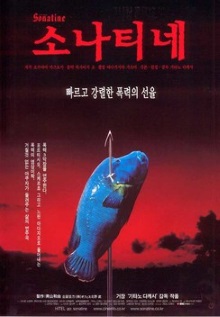
After being acquainted with director Takeshi Kitano from A Scene at the Sea, it’s only right that I pay some attention to what is likely his best known work, especially in the west. Sonatine bombed in Japan when it was released but it gradually attracted the attention of critics and other filmmakers in the west who were intrigued by its unusual style. In fact, the Japanese seemed to be so embarrassed by the film that they were reluctant to license it for distribution.
Murakawa is a Tokyo-based yakuza gangster who is feeling tired of the lifestyle despite the fact that his turf is earning good money. One day, his boss assigns him and his men to Okinawa to help out an allied gang who is under pressure. Despite suspecting that it is a trap, he goes anyway. The local gang there assures them that it is a minor matter but they soon find themselves outmatched. After their temporary headquarters is bombed and they lose one of their own in a shootout at a bar, they retreat to a secluded house by the beach to await instructions from Tokyo. Having nothing to do, the Tokyo gang members bond and relax with a couple of the local guys, playing games and dancing on the beach. One night, Murakawa spots a man attempting to rape a girl nearby but does nothing. When the man notices and confronts him however, he simply shoots the man dead, impressing the girl who then starts to hang out with them.
As with A Scene at the Sea, there’s no difficulty in understanding what’s happening on a scene to scene basis, but you might find yourself being puzzled as to what the point. Some scenes approach David Lynch levels of obscurity, such as the opening shot of the impaled fish that is also used as the film’s poster. Another is when Murakawa turns a shooting challenge into a game of Russian roulette and later dreams of shooting himself in the head. The scenes at the beach are funny but seemingly pointless as they play at being Sumo wrestlers, shoot fireworks at one another or shower in the rain. Even Murakawa’s underlings express some concern over how childish he is acting when he plays silly pranks on them.
My reading of it is that it’s meant to reveal Murakawa’s state of mind in that he is completely inured to the violence and indifferent as to whether or not he survives. Indeed the shootout scenes uniformly show the combatants standing utterly still and shooting without making the slightest effort to dodge or take cover, as if leaving it up to fate whether they get hit or not. Naturally with Takeshi Kitano himself playing Murakawa, his face is almost always expressionless, not reacting even when his compatriots are killed. He only comes alive when he indulges in silliness, yet even so his games are steeped with the same frightening fatalism and nonchalance towards death. This sense that there is indeed reflection and intent behind the surface pointlessness helps elevate the film into the realm of art though my wife seems to believe that I am overthinking it.
Regardless of whether or not you believe this film has true depth, that this is the work of a highly distinctive auteur with a unique style cannot be doubted. The beach scenes at least are highly amusing and I was not at all surprised to read that they seem to have been unscripted, with the director creating them together with the other performers. As with A Scene at the Sea, I can’t say that I particularly love this style, but it’s certainly worthy of admiration.